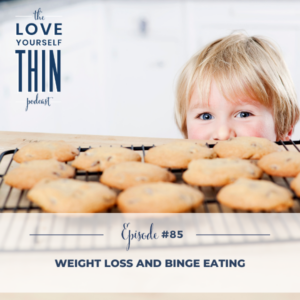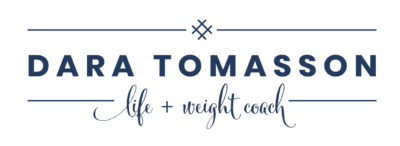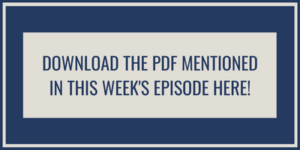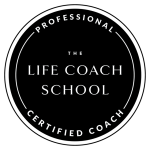
Do you catch yourself eating a large amount of food in a short period of time? Do you feel out of control about what and how much you are eating? Well then this episode is for you.
In this episode I talk about how we haven’t been taught the proper tools to use to help us process negative emotions. And this can tend to lead to binge eating and using food as a reward. I also share an important tool that can help in these instances of binge eating. Let’s go.
If you are ready to lose weight and change the way you think about hunger, sign up for the lifetime access membership for Love Yourself Thin! Doors are open and you can find all the information by clicking here.
What You’ll Learn from this Episode:
Binge eating can look different for everyone
- Why you keep doing something you aren’t happy with
Binge eating is trading temporary pleasure for long term problems
- The tool of seeking understanding versus self-critical
Listen to the Full Episode:
Featured on the Show:
- If you are ready to lose weight and change the way you think, sign up for the lifetime access membership for Love Yourself Thin! Doors are open and you can find all the information by clicking here.
- Join my free Facebook group: Liberate Mental and Physical Weight with Dara
- Leave me a review in Apple Podcasts.
- If I’m so Smart, Why Can’t I Lose Weight?: Tools to Get it Done. By Brooke Castillo
Full Episode Transcript:
85. Weight Loss and Binge Eating
Do you feel like you eat a large amount of food in a short time and feel that you can’t control what or how much you’re eating? Well, if that is you, welcome to this podcast. I’m Dara Tomasson Love Yourself Thin, episode 85, weight Loss and Binge Eating.
Okay, I really wanted to do this podcast, but I was concerned about it because I think that there is a whole spectrum of binge eating. I had the opportunity to spend a week with Geneen Roth, and it was interesting, we played this game about binge eating and it was very insightful for me. So I’m gonna explain the game that we played, but what you can expect in this episode is we’re gonna talk about all the different ways of binge eating, what those behaviors can look like. I’m going to be interchanging binge eating with secret eating. And so I’m gonna be interchanging that in the episode, and then I’m gonna talk about why it’s hard to understand why you keep doing something that you aren’t happy with doing. And then I’m gonna help you to learn the tool of seeking understanding versus going right to being self-critical.
And before we start on this episode, I am gonna share a win from one of my clients because that’s just super fun. I feel like putting more and more love in the world every time you do that. And this is a simple one, so this is a client who got fitted professionally for a bra and she finally, she did it, she got it. And she bought like three bras and she said the last time she had that size of bra was when she got married, and she is just so excited and she’s like, 69 you guys. So let’s do it. And like I joke with my clients, I’m like, you have to commit to buying bras all along the way because we need to take care of ourselves.
All right, so let’s go to, so this is a common definition that I found on the internet. So binge eating is when you eat a large amount of food. So remember a large amount, you can decide what that looks like in a short amount of time. Again, this is not you eat this many pounds of food in this amount of time. No. It’s when you eat a large amount of food in a short amount of time and feel that you can’t control what or how much you are eating. So binge eating behaviors include buying food and hiding, ordering food from a delivery service so no one can judge you, hiding the wrappers in the garbage, buying a replacement so no one will notice you ate as much as you did. Worry about being seen or found out. Spend a lot of time thinking about food.
So I’m gonna tell you about this game that I played, and it was very interesting to me because we are all on a various spectrum of how much we have done binge eating in the past or even how much you have done. And so we broke into groups and the topic was binge eating. And so we had to share a story of when we binge ate. And so everyone in the circle, in the group, they were like, oh, this is a time when I binge ate. And then they picked one person’s, I think there was five ladies in each group and they retold that story and then you had to guess whose actual story it was of the five ladies. And I remember having stories like the one lady was at a, a hotel and she ate all the food in the hotel bar, and then she felt so embarrassed about it, so she went to like a 24 hour overnight, like a 7-Eleven or something, and she bought every single one of those treats and replaced it because she was so embarrassed that the hotel would charge her for eating all those things. Another lady was talking about the ice cream and she ate the whole thing and then she was so embarrassed and she didn’t want her family to judge her, so she went back to the grocery store, bought the exact same thing, and then re-ate how far it had been already eaten so that no one would ask any questions. And then of course the hiding of the food and the wrappers and all of that and getting rid of all the evidence.
I was recently helping a client, a member, and she would buy the food and rationalize it at the store that it was for one of her kids. But she had a secret space in her sewing area where she’d put the food and when everyone went to bed or when there, no one was at home, she would go and sneak in, which is interesting that she would use the word sneak because it’s her house and her sewing area and food that she bought and eat it. And then of course, hide the wrappers. And it’s just interesting when you think about why you’re doing that. So what has your experience been with binge eating or secret eating? So if we were to play that game, what would it be? Would you have you know the secret eating? Would you go to different restaurants and order in different places because you wouldn’t want them to see you as often? Like what is that for you?
Now, this is the part where I wanna share a little bit about the tool I want for you to start looking at. Now I have these heart shaped glasses and they are adorable. I love them so much, and they have a red tint to them. And I’ve talked about this in my podcast before about in a, the quilt shop where I used to work, we would sell these red tinted glasses and it was, you’d put them on because when you are looking at your layout of your quilt, if it’s too heavy on one side, like we’re looking at value of colors and I took a class with Cheryl Arkison and she taught us when you’re doing a layout to take a picture of it and then you could change like gray scale on your phone. And it’s the same thing. It’s like being able to look at something in a different way.
And so that is what this tool is. So seeking understanding versus self-critical. Now, when I was at this Geneen Roth retreat with all these different women that are all all along the spectrum, there was women of all different sizes. People had, you know, lost and gained like hundreds of pounds over and over. Like everyone had their own unique story and I absolutely loved being around them and learning from them and learning more about myself. But when you are able to look at something like on a gray scale or through those red colored glasses, you can see things in a different way. And one of the problems that I see so many women suffer with is that every time they look at their body, every time they look at themselves, they are so self-critical. They are so mean to themselves and they can’t see another alternative. And I really suffered with this. And the interesting thing about my experience is that I wasn’t ever really, really overweight. Like, I mean, I guess it’s however you wanna look at it. Just like the definition of the binge eating was a large amount of food in a short amount of time and feel like outta control. First one person, a large amount of food could be like five pounds of food. One person, like a whole bag of chips that could be a large amount in a short period of time. Like it’s all relative.
And for me, I was 50 pounds, just over 50 pounds heavier than I am right now. And so for some people like, oh, well that’s not that much weight. But I mean, 50 pounds, if you walked around with 50 pounds of flour at Costco, you would be like, yeah, this is really heavy. But I would have to say in my experience, is that the emotional weight, the mental weight of being overweight for me was so heavy for me to bear because everywhere I went throughout the day, getting dressed in the morning, putting on my seatbelt, making food decisions, looking at myself, like shopping, everything. I was constantly over and over, why aren’t you better? Why aren’t you taking care of yourself? You’re so bad to yourself. You’re such a bad human. You’re not a very good steward of this body. You aren’t deserving of this and that, and, you’re not being a good example to your kids and you know, why wouldn’t you do better? And your husband is so disappointing that you aren’t taking better care of yourself. And why can’t you balance?
Like, these are all the terrible, horrible things that we’re just on auto play on my brain. And so of course at the end of the day, I needed to make myself some hot chocolate. Of course, at midday, I would just say, okay, no, I’m just gonna do this one thing and then tomorrow I’ll be better. Because it was exhausting. It was so challenging to be me. And I had this really, really high expectation for what kind of body I should have. And after having babies and all the story, and it was exhausting. And so even someone like me who didn’t, and it felt kind of awkward being at this retreat and then playing this game because my binge eating was very different than other people’s. But even though it wasn’t about the amount of food, it wasn’t about the time, it all goes back to what was going on in my brain. So if I was using willpower and I was being self-critical, I wasn’t able to get to that place of seeking understanding.
So I love the book. If I’m so smart, why can’t I lose weight by Brooke Castillo and this was something that was really hard for me to wrap my head around in my own experience. And so the question I have in the worksheet says, why is it hard to understand why you keep doing something you aren’t happy with? So, you know, you know that you aren’t happy, but you keep turning to the chocolate. Why do you do that? Or you keep overeating, like, why you do that? Like, we’re smart. Like why do we, why do we have that? Like why do we need to have chocolate on hand? And this is one of the problems is that we weren’t taught the tools.
It’s like me saying to you, Hey, come on over to my studio. I have this beautiful long arm and I’m gonna give you two hours of one-on-one instruction on how to quilt feathers. And it’s gonna be amazing. And I’m gonna give you everything and I have, and I’m even gonna record it. You’re gonna have the recording of it and then it’s like you saying to yourself, okay, well by next week I’ll be able to quilt an all over feather quilt. Why would that be so ridiculous for you to expect yourself to do that? Exactly. Because you haven’t had the experience, you haven’t had the muscle memory. You haven’t given yourself enough time and experience to be able to execute that level of a skill, even though you’ve been taught by a professional, even though you’ve been given the recording, even though you’ve had that hands-on attention, it wouldn’t be realistic for you to expect that you could create that high level skill in that amount of time. Now, if it was a month that you dedicated eight hours a day and then got feedback from me and all of that, absolutely no problem. But not a week, and especially if you don’t give yourself an opportunity to practice and all of that.
So it’s the same thing with your relationship with food. So you haven’t been taught how to process that negative emotion. Now, one of the things that happens with binge eating is we use food as a reward, which is a huge problem, and I will have a whole other episode on that. We also haven’t learned to create our own power and buying that food and eating that food in that moment does feel very powerful. Nobody can tell me what to do. I’m in charge of me. I can control what I eat and this is where the disordered eating can come in. And that’s one of the reasons why I’m also sharing this in this podcast and saying, you know, if you, if you are really struggling with this, it would be a really good idea to come and speak to me, and then I can help you decide if counseling is the better choice versus life coaching, because if there is, like in this disordered eating, there might be a trauma or something, and then I can help direct you to finding what’s the best fit to overcome it. Because you need to have that support. Just like if you had a broken leg, there’s a difference between a broken leg and a sprained leg, or a hurt leg or a bruised leg. And so the treatment for that is gonna be different. And one of the ways of knowing what are we gonna do is getting an x-ray and then having a person who is a trained doctor to look at that x-ray and then make that decision of, okay, let’s go there, if we need to get screws or reset it or whatever. And then we have the cast and then we keep looking at it. Versus let’s just give you a bunch of Tylenol because the symptom is that you feel pain. A doctor would never do that. They would say, well, let’s get to the root of the issue. And that’s, when I offer to come and speak to me, that is what we’re doing. We’re, we’re really looking at what is the reason why you keep doing things that you don’t want to be doing? Like why do you feel out of control?
So on the worksheet I want to invite you to just write down all the reasons why you think, so the question again is, why is it hard to understand why you keep doing something you aren’t happy with? So are you justifying, are you rationalizing? Are you going to excuses? Are you not able to see what’s really happening? Are you hiding? Why the truth is so hard to locate or believe? So what are all the reasons why you weigh more than what you want to weigh? So these are some of the common ones of, well, menopause or genetics, or I’ve just failed too many times, or I just am not strong enough or this actually was one of my favorites was I’m not smart enough. And the problem is we have to be willing to let go of our favorites. It’s kind of like giving up a soother or giving up your blankie, because if you keep going to those to feel better, the problem is it’s not going to make you feel better. It’s just gonna make it worse and you can’t fight with science. So if you continually go to turn to food for comfort, you’re going to just continually put on extra weight, and now you’re giving yourself a lot more problems. You’re having higher blood pressure, you’re having insulin resistance. You’re most likely gonna have type two diabetes. And so you’re just trading the temporary pleasure for a long-term problem. And that is why I’m here. It is why I have this podcast. It is why I help women get their power back and feel like they can make changes and they can live a life where they can change and they don’t have to believe those myths anymore.
It has been my absolute privilege and excitement to live a life where I actually have totally changed my relationship with food and my body. And it’s, it’s a journey. It’s a process and it is one of the most humbling experiences of my life to look at women and see them getting their power back. One of the issues about this false power of eating food is feeling like you can have that power, but it’s like, again, it’s fleeting. And I mean, you do have the power, but you also have the consequence. And if you don’t like the consequence of all that extra weight and the health impacts, that’s when we need to get the help. One of the things that I want to encourage you to do when I think about the tool that I have with this podcast of seeking understanding versus self-critical is looking at where did this start? Where did this habit of turning to food start?
Now one of the thoughts that came to me was, when I was a teenager and I’m, I’m sharing a lot of personal experiences just because when you hear me say it, I think sometimes people think, well, I had to have this like very big deal. No, it’s very simple. Like when I was a teenager, I would sometimes go to the video store with my older brother and we are 16 months apart and I can imagine there was a little bit of competition every once in a while. and so it was just a really happy memory. And we would go to the video store and we would have that time together. And then I would buy the dill pickle extra crunchy chips and he would get his bag of chips, and then we would just go home and we would eat an entire bag of chips all by ourselves. And so first of all, it felt like, wow, look at us, we’re big now. We can have this whole bag of chips. No one can tell us we can’t have it. We bought it with our own money. Like, it felt very powerful and it was very connecting with my brother and it was something that we did. And so potato chips was just this thing where I felt really super connected to him. And I realized later on in my life, I didn’t need to eat that dill pickle chip to connect with my brother. I could just remember that feeling that I had and I could just remember you know, I could just connect with him in that way of, hey, like I loved that I had this time with my brother and I don’t actually have to eat the chips to do that.
And so I want you to go to a time where when you ate that food, it made you feel better. And when did you start those behaviors of needing to have the food to feel more powerful or needing to have the food to escape? And when you can do that from a place of understanding versus a place of punching yourself in the face of being self-critical, you’re going to get so much insight and your power is gonna come back. And that is what I get to do. I get to help women get their power back because that is the power of life coaching. Life coaching is being able to see your thoughts, being able to see what’s going on in your brain, make sense of it, and be able to move forward in such a way that you want to move forward in and no more limiting yourself.
Ladies, when I think about being 148 pounds, my mind is blown. I can’t even believe that I’m 49 years old, I weigh 148 pounds and I’ve had five babies and I don’t track any steps. I don’t count any calories. I have done all of that with really, truly using these tools that I have on my podcast. And if you want help to do the same thing, please take advantage of my offer. I don’t know how much longer I’m gonna be able to offer this because of the growth of my business and so take advantage of it. Let’s do it. Let me coach you, bring me any question, bring me any problem, and I will help you solve it, and then we can have that conversation and it will just be in 30 minutes of what’s the best fit for you. I am so grateful to help women in this way. All right, take care everyone. Talk to you later. Bye.






